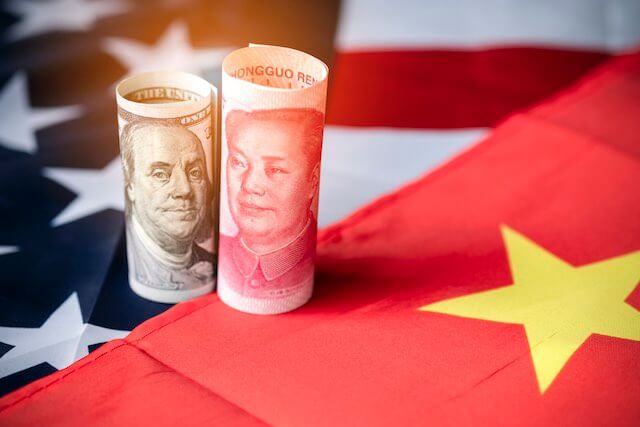As a Chinese balloon that is suspected of a spy mission has been flying across the United States, Florida Senator Marco Rubio is again proposing new restrictions on investments by the federal government’s Thrift Savings Plan (TSP). The purpose of the restrictions is to limit TSP money from being used to bolster China’s military and industrial capacity.
In a recent column, Senator Marco Rubio (R-FL) wrote:
Unfortunately, American finance in the 21st century is more like the Ponzi scheme.
Perhaps the most glaring example is Wall Street funneling cash into companies either directly or indirectly controlled by the Chinese Communist Party. No nation can survive by giving jobs and money to an adversary. It was naive when it began a few decades ago, and it is dangerously stupid now.
Of course, there is immense opposition to reorienting our economic relationship with China and returning finance to its appropriate and productive place in our economy. Incredible wealth and political influence are tied to the status quo. But that status quo is weakening America. The U.S. government must play an active role in changing the incentive structures that brought us to this point. This means strengthening tools to block and penalize investments that undermine national security, and incentivizing investors to bring capital back to America and put it to work in revitalizing our innovative and productive capacity.
TSP Should Not Harm the National Security of the United States
The Florida senator is now following up with a bill entitled the TSP Fiduciary Security Act (S. 149). The bill states that is is the duty of the Federal Retirement Thrift Investment Board to manage the Thrift Savings Fund in the best interests of the beneficiaries of the Fund and includes a duty not to harm the national security of the United States.
As the title implies, the bill would impact the federal government’s Thrift Savings Plan (TSP). This is not the first time Senator Rubio has tried to get Congress to pass legislation that would limit American investments in China. In the past, attempts to force the Federal Retirement Thrift Investment Board to take action to restrict investment in countries such as China and Russia have generally not been successful.
There is no doubt that there is more fear of China as a military adversary than was the case a few years ago. A four-star U.S. Air Force general said in a memo recently “his gut told him the United States would fight China in the next two years….”
Whether this concern will make a difference in getting the Rubio bill through Congress remains to be seen. In the past, FRTIB spokeswoman Kim Weaver said, “Our basic premise is that if it is legal for any other Americans to invest, it should be legal for TSP participants.”
This is similar to an earlier quote from former FRTIB Chairman Michael Kennedy on the issue of the TSP investing in Chinese companies.
Countries Covered by Fiduciary Security Act
The countries covered by the Fiduciary Security Act are the People’s Republic of China, the
Russian Federation, North Korea, Iran, Syria, Sudan, Venezuela, or Cuba as well as “any country, the government of which the Secretary of State determines has provided support for international terrorism….”
Prohibition of Investments and Voting Rights Under This Bill
The TSP Fiduciary Security Act largely addresses investments and voting rights for investments by the TSP. It would require that the exercise of voting rights be reviewed by the Secretary of Homeland Security, and the Secretary of the Treasury, Secretary of Defense, and the Attorney General.
The law would also states that any investment by the TSP that includes Communist Chinese military companies as outlined in the bill does not comply with the proposed law.
As noted above, Senator Rubio has been active in proposing legislation that would strengthen America’s national security. He has announced he is reintroducing eight bills to “protect American consumers, workers, and investors from exploitation by the Chinese Communist Party.”
“Our nation needs a strong response to Communist China’s disruptive and exploitative tactics. Too many American families, communities, and critical industries are suffering due to Beijing’s unfair and predatory policies. Congress needs to reverse course and guard the American people from this genocidal regime, not assist in its rise.” — Senator Rubio
Frequently Asked Questions
Does the TSP invest in companies linked to the Chinese military?
The Coalition for a Prosperous America has reviewed investments in international mutual funds from TSP investment managers State Street, BlackRock and others. These and other Fund Advisors were weighted 14% to 33% toward Chinese securities. A number of companies in the funds appear on two government lists—the Defense Department list of companies linked to the Chinese military or the Commerce Department’s “entity list” of companies subject to trade sanctions.”
What is the FRTIB?
The Federal Retirement Thrift Investment Board (FRTIB) is an independent government agency that administers the Thrift Savings Plan (TSP).
What is the TSP?
The Thrift Savings Plan (TSP) is a retirement savings and investment plan for federal government employees and uniformed services members, including the Ready Reserve. Established by Congress in the Federal Employees’ Retirement System Act of 1986, the TSP offers the same types of savings and tax benefits that many private corporations offer their employees under 401(k) plans.



